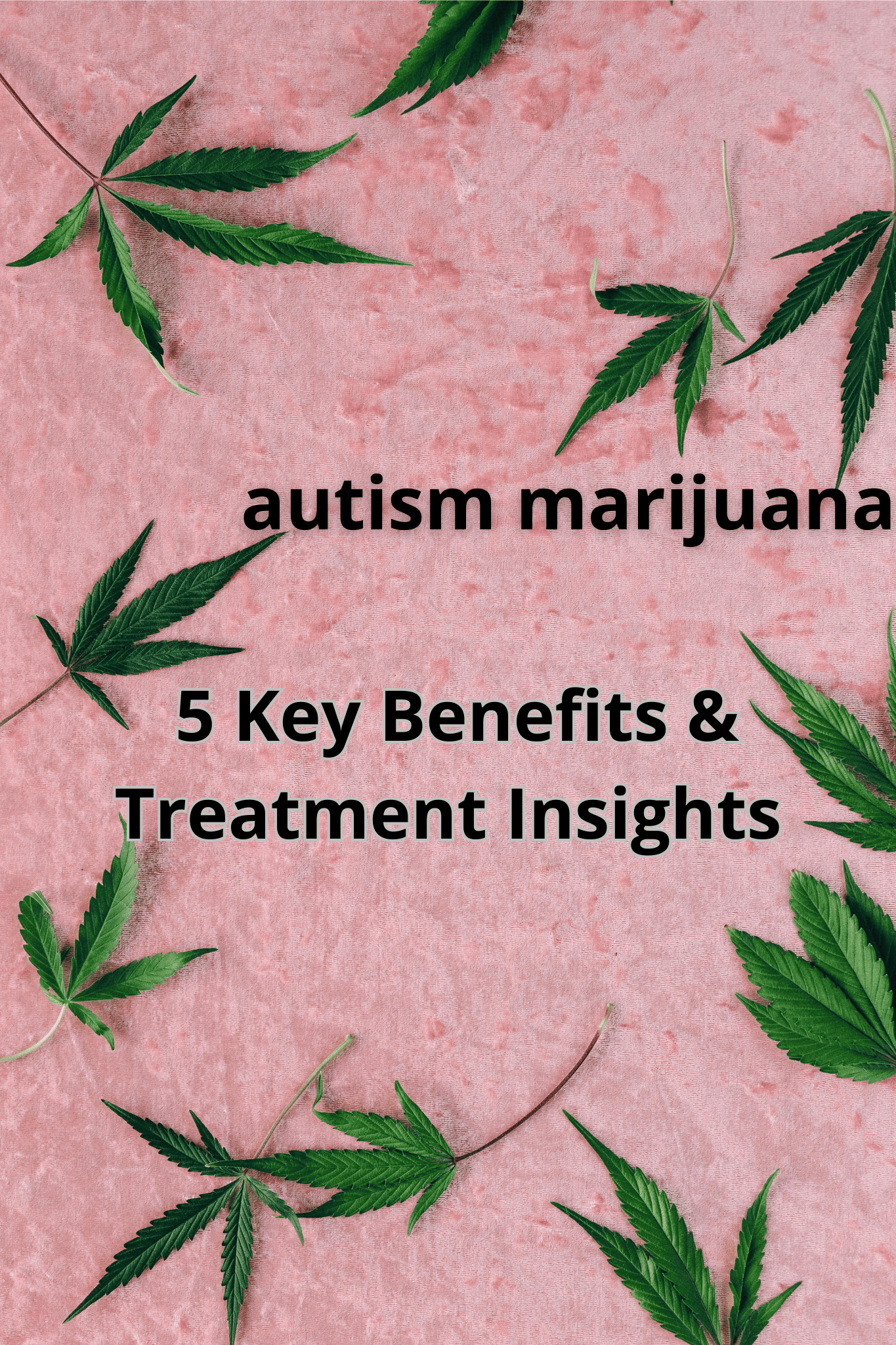With 9 years of experience in the kitchen, I’m passionate about crafting delicious recipes and sharing them with food lovers worldwide. 🍽️✨ Whether it’s a comforting homemade dish or a creative cocktail, my goal is to make cooking fun, easy, and enjoyable for everyone. Join me on this flavorful journey! 🍹🥗

Autism Marijuana: 5 Key Benefits & Treatment Insights
Autism Marijuana: 5 Key Benefits & Treatment Insights
The use of cannabis as a potential treatment for managing symptoms associated with Autism Spectrum Disorder (ASD) is a topic of increasing interest and debate. While research is still in its early stages, some studies and anecdotal evidence suggest that cannabis may offer relief for certain challenges faced by individuals with autism. This article will delve into the potential benefits of using marijuana for autism, explore the current research landscape, discuss safety considerations, and share insights from parents and caregivers who have explored this option.
Why Consider Marijuana for Autism?
Autism Spectrum Disorder is a complex neurodevelopmental condition characterized by a wide range of symptoms, including social communication difficulties, repetitive behaviors, anxiety, and sensory sensitivities. Traditional treatments often focus on behavioral therapies, educational interventions, and medications to manage specific symptoms. However, some individuals and families seek alternative or complementary therapies, such as cannabis, to address unmet needs and potentially improve overall quality of life. The potential for cannabis to alleviate certain challenging symptoms, like anxiety and aggression, drives interest in its use. You can learn more about our organization and our mission to provide informative content on autism.
Potential Benefits of Cannabis for Autism
While more research is needed, preliminary studies and anecdotal reports suggest several potential benefits of cannabis for individuals with ASD. These include:
- Reduced Anxiety and Stress: Cannabis may help regulate the endocannabinoid system, which plays a role in mood and stress response.
- Improved Sleep: Some individuals with autism experience sleep disturbances. Marijuana, particularly strains high in CBD, may promote relaxation and improve sleep quality.
- Decreased Aggression and Irritability: Cannabis may have calming effects that can help reduce aggression and irritability in some individuals with autism.
- Improved Focus and Attention: While more research is needed, some parents report that cannabis helps their children with autism focus and concentrate better.
- Reduced Seizures: Some studies have shown that CBD, a non-psychoactive component of marijuana, can effectively reduce seizures in individuals with certain forms of epilepsy, which can sometimes co-occur with autism.
Research and Evidence Supporting Cannabis Use
The scientific evidence supporting the use of cannabis for autism is still limited, but the number of studies is growing. A 2019 study published in *Neurology* found that cannabis treatment improved behavioral outbreaks in 61% of participants with autism. Another study published in *Frontiers in Pharmacology* in 2021 suggested that CBD-rich cannabis oil may improve symptoms of autism, such as anxiety and communication difficulties. However, it is important to note that these studies are often small and have limitations, so larger, well-controlled trials are needed to confirm these findings.
Furthermore, the National Academies of Sciences, Engineering, and Medicine published a comprehensive report on the health effects of cannabis and cannabinoids, which highlights the need for more research in this area. You can find more information on this topic on Wikipedia.
Safety Considerations and Potential Risks
While cannabis may offer potential benefits, it’s crucial to consider the safety considerations and potential risks associated with its use. These include:
- Psychoactive Effects: THC, the psychoactive component of marijuana, can cause anxiety, paranoia, and cognitive impairment in some individuals. It is essential to use low-THC or CBD-rich products to minimize these effects.
- Drug Interactions: Cannabis can interact with certain medications, so it’s crucial to discuss its use with a healthcare professional.
- Potential for Dependence: Although the risk of addiction to cannabis is generally considered lower than for other substances, it is still a possibility, especially with frequent and high-dose use.
- Long-Term Effects: The long-term effects of cannabis use, particularly on the developing brain, are not fully understood.
- Quality Control: The cannabis industry is not always tightly regulated, so it’s essential to purchase products from reputable sources that provide third-party testing results.
Before considering cannabis for your child, consult with a qualified healthcare professional who is knowledgeable about cannabis and autism.
Dosage and Administration of Cannabis
Determining the appropriate dosage and administration method for cannabis is crucial for maximizing potential benefits and minimizing risks. It is essential to work with a healthcare professional who can provide guidance based on the individual’s specific needs and circumstances. Generally, a “start low and go slow” approach is recommended. This involves starting with a very low dose and gradually increasing it until the desired effects are achieved, while closely monitoring for any adverse reactions. The most common methods of administration include:
- Oils and Tinctures: These are administered orally and allow for precise dosing.
- Edibles: Edibles can be a convenient way to administer cannabis, but it’s important to be aware that the effects may be delayed and more prolonged.
- Vaporizing: Vaporizing involves heating cannabis to release its active compounds without combustion. This method may provide faster relief than edibles.
It’s crucial to avoid smoking cannabis, as it can have harmful effects on the respiratory system.
Legal Status of Medical Marijuana
The legal status of cannabis varies widely depending on the state and country. Some states have legalized medical marijuana for specific conditions, including autism. Others have legalized recreational marijuana, which may also be accessible to individuals with autism. It’s crucial to understand the laws in your jurisdiction before considering the use of cannabis. Even in states where medical marijuana is legal, you may need to obtain a recommendation from a qualified healthcare professional to access it. You can find the latest information on cannabis laws on reputable legal websites or by consulting with an attorney.
Parent Experiences with Cannabis
Many parents of children with autism have shared their experiences with cannabis. Some have reported significant improvements in their children’s symptoms, such as reduced anxiety, improved sleep, and decreased aggression. However, it’s important to note that these experiences are anecdotal and may not be representative of all individuals with autism. Some parents have also reported negative side effects, such as increased anxiety or irritability. It’s crucial to weigh the potential benefits and risks carefully and to consult with a healthcare professional before considering cannabis for your child. Remember to contact us if you have further questions about autism resources.
Expert Opinions on Marijuana for Autism
Expert opinions on the use of cannabis for autism vary. Some healthcare professionals are cautiously optimistic about its potential, while others remain skeptical due to the lack of robust scientific evidence. Many experts emphasize the need for more research to determine the efficacy and safety of cannabis for autism. They also stress the importance of individualized treatment plans and close monitoring by a healthcare professional. It’s crucial to seek out the opinions of qualified professionals who are knowledgeable about both autism and cannabis before making any decisions.
Alternative Therapies for Autism
While cannabis is gaining attention, it’s important to remember that it is not the only therapy available for autism. Other effective therapies include:
- Applied Behavior Analysis (ABA): ABA is a widely used therapy that focuses on teaching specific skills and reducing challenging behaviors.
- Speech Therapy: Speech therapy can help individuals with autism improve their communication skills.
- Occupational Therapy: Occupational therapy can help individuals with autism develop skills for daily living.
- Sensory Integration Therapy: Sensory integration therapy can help individuals with autism manage sensory sensitivities.
- Medication: Medications may be used to manage specific symptoms, such as anxiety or ADHD.
A comprehensive treatment plan for autism often involves a combination of therapies and interventions tailored to the individual’s specific needs.
Future Research Directions
Future research on cannabis for autism should focus on:
- Conducting larger, well-controlled clinical trials to evaluate the efficacy and safety of cannabis for autism.
- Identifying specific subtypes of autism that may be more responsive to cannabis treatment.
- Investigating the optimal dosages and administration methods for different cannabis products.
- Examining the long-term effects of cannabis use on the developing brain.
- Developing standardized cannabis products with consistent cannabinoid profiles.
More research is needed to fully understand the potential role of cannabis in the treatment of autism.
Additional Resources
For more information on cannabis and autism spectrum disorder, consider exploring these resources:
- Autism Speaks: https://www.autismspeaks.org/
- National Autism Center: https://www.nationalautismcenter.org/
- The Autism Society: https://www.autism-society.org/
- PubMed: https://pubmed.ncbi.nlm.nih.gov/ (for scientific research articles)
Consult with a qualified healthcare professional for personalized advice and treatment options.
Frequently Asked Questions About Cannabis
Is marijuana safe for children with autism?
The safety of cannabis for children with autism is a complex issue. While some studies suggest potential benefits, such as reduced anxiety and improved sleep, there are also potential risks, including psychoactive effects, drug interactions, and long-term effects on the developing brain. It’s crucial to consult with a qualified healthcare professional who is knowledgeable about cannabis and autism before considering its use. They can help you weigh the potential benefits and risks and determine whether it is appropriate for your child.
What type of marijuana is best for autism?
There is no one-size-fits-all answer to this question. The best type of cannabis for an individual with autism depends on their specific symptoms, sensitivities, and medical history. Generally, products with a high CBD-to-THC ratio are preferred, as CBD is non-psychoactive and may offer therapeutic benefits without the intoxicating effects of THC. However, some individuals may benefit from small amounts of THC. It’s essential to work with a healthcare professional to determine the optimal cannabinoid profile and dosage for your specific needs. You can also explore different forms of administration, such as oils, tinctures, or edibles, to find what works best for you. Remember to purchase products from reputable sources that provide third-party testing results to ensure quality and safety.
Can marijuana cure autism?
No, cannabis cannot cure autism. Autism Spectrum Disorder is a complex neurodevelopmental condition, and there is currently no known cure. However, some studies and anecdotal evidence suggest that cannabis may help manage certain symptoms associated with autism, such as anxiety, aggression, and sleep disturbances. It is important to view cannabis as a potential tool for symptom management rather than a cure.




